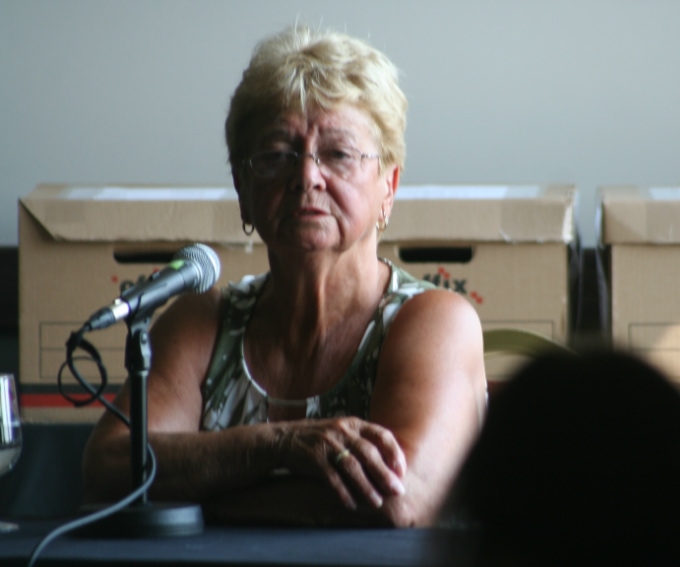
KJIPUKTUK (Halifax) – The mother of a man who lives at Quest Regional Rehabilitation Centre in Lower Sackville told a human rights tribunal today that the institution is the right place for her son, who lives with cerebral palsy and uses a wheelchair.
“Joey is happy at Quest. He has a beautiful room, a beautiful yard. It’s quiet. He goes on outings,” said Betty Rich. “Small option homes aren’t a good solution for Joey. It may well be that small options works for others, but I am the mother, and I must make my own calls.”
The Nova Scotia Human Rights enquiry is asked to decide whether the lack of supportive community housing options for people with disabilities is a human rights infringement.
The complaint was initiated by Beth MacLean and Joseph Delaney in 2014. The enquiry started in February of this year, there have been some 20 days of testimony so far.
Complainants MacLean and Delaney live at the Emerald Hall psychiatric ward, an annex of the Nova Scotia Hospital, against their will and without medical justification. They want to live in an small option home, with three or four co-residents and with better opportunities to interact with the community.
Rich was testifying on behalf of the department of Community Services, the defendant in the case.
Defendant she may be, but she wasn’t an unqualified cheerleader for large institutions. Joey’s mother had plenty of complaints about several of the institutions where Joey, who is 50 years old, has stayed over the years.
Rich singled out Braemore Home in Cape Breton, and a six year stay at a self-contained unit on the first floor at Sunrise Manor on Gottingen Street in Halifax, as particularly bad experiences.
Braemore Home’s license was pulled in 2011, after management was found unable to control staff abuse of residents. Rich described the Sunrise Manor accommodation as “shoving 11 residents into a sardine can in the most crime-infested area in the city. She also mentioned how she received no support from Community Services or politicians when she wanted these situations addressed.
Rich is certain that Quest is the right place for Joey.
“When Joey is home from Quest he misses his fellow residents. Staff is great, it’s a hard job, and they get criticized a lot. Try walking in their shoes.” she said.
“The decision to let him go was hard and painful, but it was best for Joey,” said Rich, who lives in Cape Breton. “I don’t lay my head on the pillow each night without thinking of Joey. He’s never off my mind.”
“I commend Mrs. Rich for her strong efforts on behalf or Joey,” David Kent, president of People First Nova Scotia, told the Nova Scotia Advocate. Kent is attending the enquiry. People First, together with the Nova Scotia Association of Community Living, is a co-complainant in the case.
“At our organization, People First, we speak for ourselves, and we don’t agree with these institutions. I have a daughter with an intellectual disability, and I would never want to see her in an institution,” Kent said.
Cindy Carruthers, People First executive director, strongly agrees.
“Parents do the best they can with the choices they are given. Has there ever been an opportunity to really consider reasonable alternatives,” Carruthers wonders. “Has Joey’s mother ever witnessed somebody comparable to her son living as independently as they can and being cared for by wonderful staff?”
“If Joey had that opportunity to live in a small option home, go down to the wharf every day, decide what he wants to eat, go home for the weekend, maybe he would like that better.”
If you can, please support the Nova Scotia Advocate so that it can continue to cover issues such as poverty, racism, exclusion, workers’ rights and the environment in Nova Scotia. A paywall is not an option, since it would exclude many readers who don’t have any disposable income at all. We rely entirely on one-time donations and a tiny but mighty group of dedicated monthly sustainers.
Subscribe to the Nova Scotia Advocate weekly digest and never miss an article again.




I was just reading this article, and I need to say something about what I saw while reading this. I know the disability cerebral palsy right well. I have a few friends who have cerebral palsy. Because of his disability I can defiantly understand his need to using a wheelchair and his need for a high level of care. However people have also got to understand that even know yet some people, if not many who have this disability are using wheelchairs their are others with this disability who do not need wheelchair. Their are many levels of this disability.
As for the argument of weather or not quest is best for this person, my suggestion here is why not create yet a different type of living arrangement other then Small Options homes for these people who may need higher levels of supports like the person who this article talks about. The overall point I am trying to make here is “just because he has the disability he has his right to be part of the wider community should not be interfered with”. People who live at places like Quest feels like they cannot be part of their community.
I have heard that in other provinces besides Nova Scotia verouis solutions for living options outside of institutions got created.